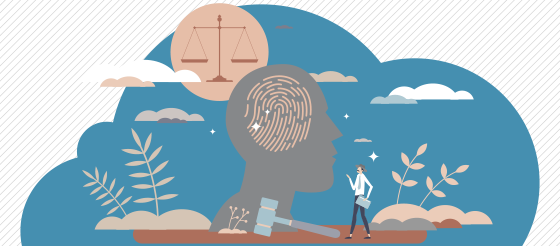Overview of Psychology and Law
The field of psychology and law involves applying scientific and professional aspects of psychology to questions and issues relating to law and the legal system. This field encompasses contributions made in different disciplines – research, clinical practice, public policy, and teaching/training, among them – from a variety of orientations within the field of psychology, such as developmental, social, cognitive, and clinical.
Mental health professionals and behavioral scientists have been involved with the legal system in various ways for many years. However, more formalized interactions were established beginning in the 1970s, including the first psychology-law program at the University of Nebraska at Lincoln, the formation of the American Psychology-Law Society (now Division 41 of the American Psychological Association), the initiation of an interdisciplinary journal (Law and Human Behavior) and a book series (Perspectives in Law & Psychology). Since then, the field has grown steadily, with an increased number of pre-doctoral and post-doctoral training programs, journals, and books devoted to psychology and law, specialized ethical guidelines for forensic psychologists, conferences, and the involvement of psychologists in filing amicus briefs before the U.S. Supreme Court.
Subspecialties in Psychology and Law
Clinical-Forensic Psychologists
Clinical forensic psychologists who are primarily interested in forensic practice may work in secure forensic units, community mental health centers, jails, prisons, courts, specialized agencies, or private practice. They may also be involved in teaching, training, or supervision in a psychology department, a medical school, a hospital, an interdisciplinary institute, or a clinic. Such professionals may also conduct research and scholarship in areas such as violence risk assessment, treatment needs and response, and decision-making strategies.
Developmental Psychologists
Developmental psychologists are also based in academic, medical, and professional school settings. They often become involved in legally relevant research and consultation with children and adolescents. There are important questions regarding the testimony of children (accuracy and influences, for example), the knowledge and decision-making of adolescents involved in the juvenile justice system, and the needs of children and families involved in divorce or separation that are among the areas addressed by the research and consultation of developmental psychologists. In addition, such psychologists may become active in attempting to develop a policy regarding children and families through federal and state legislation or implementing such a law on the community level.
Social Psychologists
Social psychologists are more likely to work in academic positions, such as psychology departments, medical schools, schools of criminal justice, or research and policy institutes. Frequently such individuals are very active in research, graduate training, and undergraduate teaching. They may also consult with attorneys, courts, and agencies on issues relevant to their study in legal areas; examples include witness credibility, jury selection, confessions, and decision-making influences. Some non-university-based social psychologists work as consultants full-time, providing services to trial attorneys. In contrast, state or federal agencies may employ others (e.g., corrections, mental health) to conduct relevant research.
Cognitive Psychologists
Cognitive psychologists are trained primarily as researchers and teachers in human perception and memory. They tend to focus their research and consultation on such legally-relevant questions as eyewitness identification, the accuracy of memory, and deception detection. Their employment settings are typically university-based. Their analysis can be fundamental when courts must weigh testimony about events that may have occurred months or even years ago. Providing the results of such a study to courts and legislators by summarizing the “state of the science” on a given question is a task of some cognitive psychologists. Cognitive psychologists have recently begun working with law enforcement agencies to develop investigative procedures to enhance the likelihood of accurate memory and testimony about crimes and accidents.
Community Psychologists
Community psychologists are likely to work in academia and out in the community. Community positions include working in government agencies, non-profit agencies, foundations, and community-based advocacy and service settings. For community psychologists who conduct law-related research, activities can span the range of policy and law formulation, implementation, evaluation, and change. For example, they might design and evaluate juvenile delinquency prevention and treatment programs, research adolescents’ competence to participate in legal proceedings, investigate the impact of court involvement on the functioning of crime victims, or evaluate the effects of health care and welfare reform.
Additional Careers
Finally, some psychologists receive more extensive training in law and obtain a JD (Juris Doctorate) or MLS (Master of Legal Studies) in addition to their training in psychology. Such individuals may become involved in legal scholarship in law relevant to the behavioral sciences. They may work in law schools and other academic or applied settings described above. In addition to law teaching and scholarship, such individuals may become involved in psychological research or practice (depending on their specialization within psychology) or legal practice as an attorney.






















